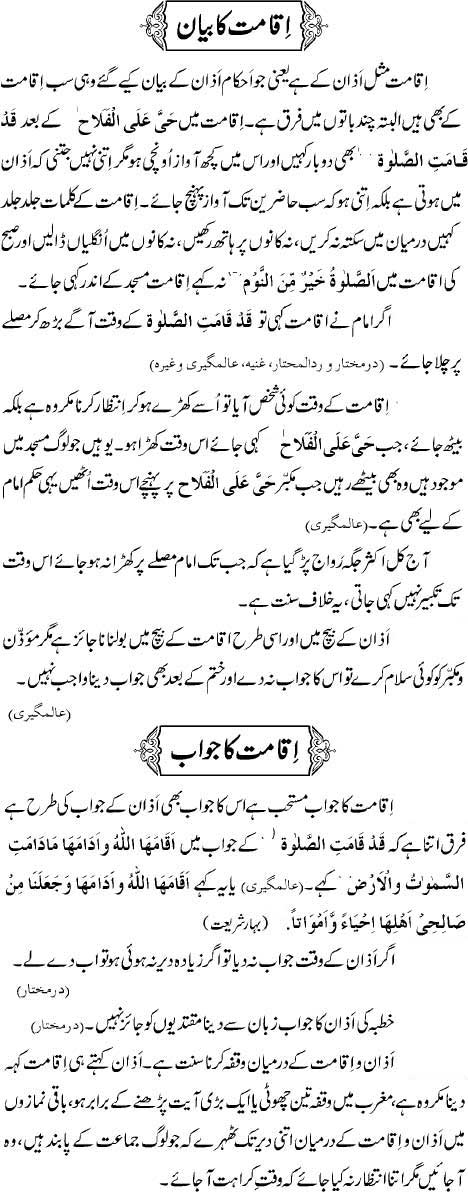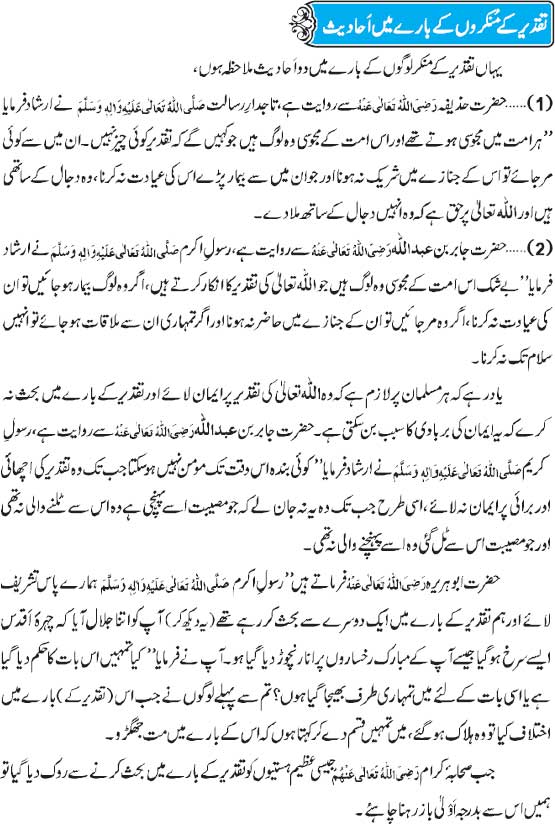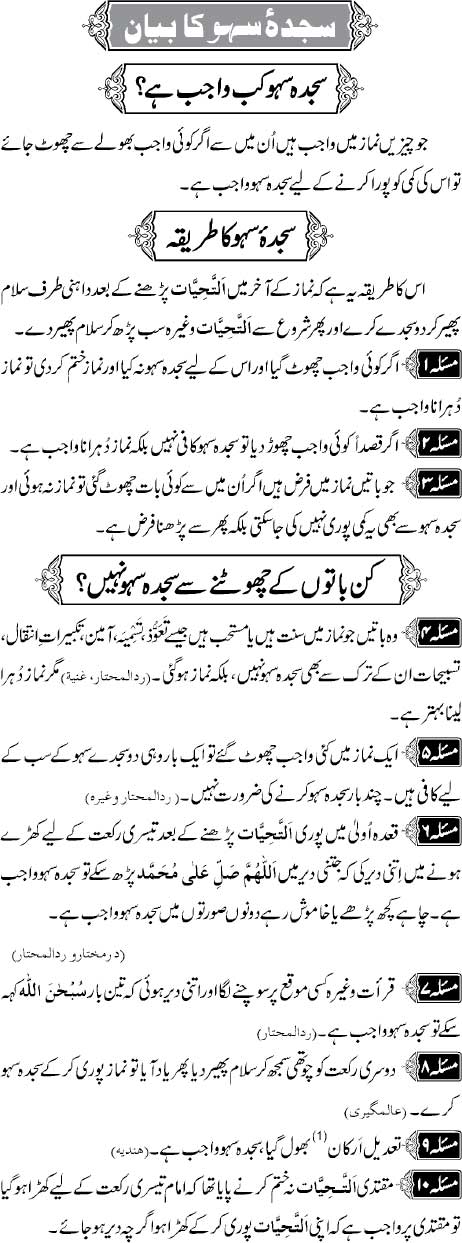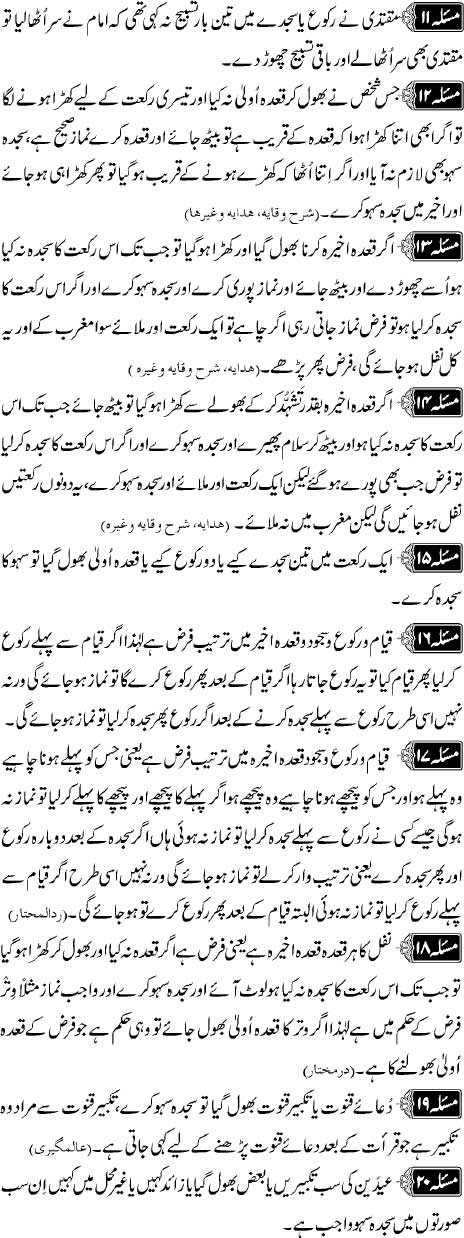
Iqamat Kay Ahkam
Kin Auqat Mein Nafil Parhna Mana Hai

Kin Auqat Mein Nafil Parhna Mana Hai
Marriage After A Hard Battle
When the Prophet (peace be upon him) settled in Madinah, he put relations among the different communities living in the city on a proper basis. There were the Muslims who were composed of two main groups: The Muhajirin who had migrated from Makkah, and the Ansar, or the Arabs who lived there but responded to the Prophet’s call and adopted Islam. Their numbers were always on the increase as more and more of their tribesmen and women adopted Islam every day. There were also the Arabs who retained their idolatrous beliefs and did not accept Islam. Their numbers might have been considerable to start with, but dwindled into insignificance as time passed. There was also the Jewish community which consisted of several tribes. The Prophet ordered a charter to be written down, organizing relations between all these groups. This became the first written constitution in the history of mankind. It established a pluralist society where different communities could live in peace and with mutual respect.
However, relations with the Jews did not run very smoothly, with one tribe after another violating this constitution or coming into open alliance with the enemies of the Muslim state. The result was the evacuation from Madinah of the three major Jewish tribes, one after another. By the end of the fifth year of the Prophet’s settlement there, Madinah became a largely Muslim city, with a small number of hypocrites pretending to be Muslim when they were truly unbelievers and a handful of others who remained idolaters. Now the Jews concentrated in the city of Khaybar, to the north of Madinah, from where they engaged in trying to forge a new alliance of forces. The Prophet moved quickly to forestall these efforts. He laid siege to Khaybar and its forts fell to him, one after another. He then made a peace agreement with the Jews, allowing them to stay and farm the land in return for half its produce.
When the battle was over, Safiyyah was brought to the Prophet. She, like many others of her people, was taken captive and faced a life of slavery. She was a young woman. Some reports suggest that she was only 17, but, most probably, this is inaccurate. She had been married twice before, with the second marriage taking place only a few months earlier. Her second husband, Kinanah ibn Al-Rabie, was killed during the battle. He was one of the main Jewish chiefs, exceedingly hostile to Islam and the Prophet. He had worked hard to stem the tide of Islam.
Thus, both Safiyyah’s father and husband were killed by the Muslims. Now she was being brought to face the Prophet because in her position the Muslims felt that he should be the one to decide her fate. As it happened, it was Bilal who led her, and another Jewish woman, through a yard where there were many bodies of people who were killed in the battle. The other woman wailed loudly, but Safiyyah adopted a dignified attitude. When the Prophet realized what had happened, he remonstrated with Bilal, saying: “Has mercy departed from your heart? How can you lead two women across a place where they would pass by the bodies of their killed people?”
What fate awaited Safiyyah? The Prophet looked at her and then offered her two alternatives: Either he would send her back to her people, or she would be set free and marry her. She chose the latter. He, therefore, assigned her to Umm Sulaym, to look after her and prepare her for the impending marriage. She needed to complete her waiting period first.
– By Adil Salahi
Hadith: Taqdeer Kay Munkir

Hadith: Taqdeer Kay Munkir
Non-Mahram In Islam
What does Islam say about having Boyfriends or Girlfriends?
Islam strictly forbids us to have any kind of relationship with a Non-Mehram ( people you can get married to) whether it’s just a friendship relationship or a love relationship or even a fiance relationship.
Before Nikkah, no contact should be between a man and a woman. Cause; remember when two people are alone (a boy and a girl) the third person there is Satan (Evil), who always encourages you to commit sins and as a result, it leads to Zina/Fornication.
And as Muslims, we must know that Fornication or Adultery, (sex outside marriage) is Haram in Islam. It is considered to be one of the major sins.
Dear brothers and sisters in Islam, are we so pious that we can afford to carry these sins with us to the Hereafter? If you ask me, I’ll have to say no, because I know that, the weight of my sins is way heavier than my rewards, so, therefore, I can’t afford to commit those sins, and I am sure neither can you.
Many of us claim that we are not doing anything wrong, just by talking on the phone or chatting, writing a mail, or e-mailing, with our boyfriends or girlfriends. But we have to realize that, it is still wrong to do that because we are still in contact with a non-mahram, which is again strictly prohibited in Islam.
And some others say that it’s ok if they talk to their fiance or future husband/wife, but what is the guarantee that, this person will end up being your life partner? Then why, waste our jewels or modesty, unnecessarily?
Allah Tallah has mentioned to us that, “the Zina of the ear is what you hear, the Zina of the tongue is what you say, the Zina of the mind is what you think, the Zina of the hand is what you touch, and the Zina of the eye is what you see”. Is it still not clear enough that by any sort of contact we are still committing sins?
By saying “I love you” to any boy/girl, we are committing the Zina of our tongue, by hearing something like that from someone, we are committing the Zina of our ear, and so on.
So, therefore, dear brothers and sisters, it’s time we wake up and open up our hearts and ears and turn back to Allah’s command. We can’t allow the devil to take over us. The person we sacrifice for the sake of Allah, surely Allah will grant them happiness.
This is especially for Women:
Allah Talla has given us (the women) the best jewel we could have, and that gets lost when we expose it in front of other men. The women’s bodies are like rose petals and if touched or seened to much over and over again, they will lose their luster. Would any of us keep our diamonds displayed in public? Then, why is it that we are showing our bodies to others?
We have to remember that, whatever Allah Talla commanded us to do is what is best for us.
Kissing is not allowed in Islam
Hugging is not allowed in Islam
Talking on the phone with non-mahram is not allowed in Islam
Writing mail is still not allowed in Islam
And remember to do Istikhara Salah before you marry anyone, because Allah is All-Knowing, and He knows what we know not. Like a person by their Iman, not by how they look, or what they have, or what they are.
May Allah Talla give us the ability to stay away from these evil acts and bless us with His Mercy and guide us on the right path. Ameen.
Kaaba Ki Chat Par Azan

Kaaba Ki Chat Par Azan
by Hafiz Muhammad Idrees
Difference Between Believer And Non-Believer
[6. Surah Al-An’am: Ayah 120] And abandon open and secret sin; surely they who earn sin shall be recompensed with what they earned.
[Sahih Muslim: Book 1 Kitab Al-Iman, Number 144] It is narrated on the authority of Abu Huraira (Radi Allah Anhu) that when the son of Adam recites the Ayat of Sajdah (prostration) and then falls down in prostration, the Satan goes into seclusion and weeps and says: Alas, and in the narration of Abu Kuraib the words are: Woe unto me, the son of Adam was commanded to prostrate, and he prostrated and Paradise was entitled to him and I was commanded to prostrate, but I refused and am doomed to Hell.
[Sahih Muslim: Book 1 Kitab Al-Iman, Number 146] It is narrated on the authority of Jabir (Radi Allah Anhu) that he heard the Apostle (may peace and blessings be upon him) saying. “Verily between man and between polytheism and unbelief is the negligence of prayer.”
[Sahih Muslim : Book 1 Kitab Al-Iman, Number 147]
It is narrated on the authority of Abu Zubair (Radi Allah Anhu) that he heard Jabir b. ‘Abdullah (Radi Allah Anhu) saying. I heard the Messenger of Allah (sal-allahu-alleihi-wasallam) observing this: “Between man and polytheism and unbelief is the abandonment of salat.”
[Sahih Muslim: Book 1 Kitab Al-Iman, Number 151] It is narrated on the authority of ‘Abdullah b. Mas’ud (Radi Allah Anhu) that he observed. I asked the Messenger of Allah (sal-allahu-alleihi-wasallam) which deed was the best. He (the Holy Prophet) replied: Prayer at its appointed hour. I (again) said: Then what? He (the Holy Prophet) replied: Kindness to the parents. I (again) said: Then what? He replied: Earnest endeavor (Jihad) in the cause of Allah. And I would have not ceased asking more questions but out of regard (for his feelings).
[Sahih Muslim: Book 1 Kitab Al-Iman, Number 155] It is reported on the authority of ‘Abdullah (Radi Allah Anhu) that the Apostle of Allah (sal-allahu-alleihi-wasallam) observed: The best of’ the deeds or deed is the (observance of) prayer at its proper time and kindness to the parents.
My Lord! grant me that I should be grateful for Thy favor which Thou hast bestowed on me and on my parents and that I should do good such as Thou art pleased with, and make me enter, by Thy mercy, into Thy servants, the good ones.
Hifz-e-Quran Kay Ahkam Aur Fazail

Hifz-e-Quran Kay Ahkam Aur Fazail
The Superiority Of Supplication At The Time Of Azan, Iqamah, And Saalatul Jumma
Allahumma Salli Ala Sayyidina Muhammadin Wa-Ala Ali Muhammadin Wa-Sabibi Wa-Sallim
YA GHAWTHU’L-A’ZAMU AGHITH-NI FI KULLI AHWALI WA’NSUR-NI FI KULLI AMALI WA TAQALLAB-NI FI TARIQI-KA BI-HURMATI JADDI-KA MUHAMMDINWA BI-SHIFA’ATI-HI WA RUHI-HI WA SIRRI-H.
Hazrat Anas Ibn Malik has said, our Nabi has said: “The dua is never refused between the azan and the iqamah, so call unto Allah.”
Hazarath Anas Ibn Malik has said, our Nabi has said: “When the call for Salah is made, the heavens doors open, and the duas are accepted.”
Hazarath Abu Hurairah has said: “I came to the mountain of Thoor and I met a Rabbi. I spoke to him about Nabi and he spoke to me about the Torah. We did not disagree on anything right until we completed our conversation, and I said to him: “The Messenger of Allah has said: On the day of Jum-ah, there is a time that if a believer gets it, there is nothing good he asks Allah for, except that it will be granted to him! The Rabbi asked, “In every year?” I said: but in every Jum-ah, that is what the Messenger of Allah said!”
So he went away for a little while, then he returned to me, and he said: ” You have spoken the truth, By Allah, It is like the Messenger of Allah said, it is every Jum-ah and indeed (Jum-ah) is the greatest of days, and the dearest of days to Allah, in it Adam was created, and in it, he was placed in Paradise, and in it, he was expelled from paradise and in it will the day of Ressurection, and there is no animal except that it is…, and it waits for the day of Jum-ah, except Man and Jin.”
Amar Ibn Auf Muzni narrated from his father who narrates from his grandfather, that Rasulullah has said: ” Indeed on the day of Jum-ah there is time, no servants ask for anything, except he will be granted what he asks.” It was said to him “Which time is it O’ Messenger of Allah?” He replied: “The salah time until the people return from it”
Hazrath Jabir Ibn Abdullah says that our Nabi said: ” The Messenger of Allah supplicated in the musjid at the battle of the Trench on Monday, Tuesday, Wednesday, and his call was answered on Wednesday between the two salaahs, face (at that time. Hazrath Jabir Ibn Abdullah says from himself: “So nothing of importance had ever come upon me, except that I waited that particular time of that day, except that I asked, and I knew of the answer to my supplication.”
Hazrath Abu Hurairah has stated that the Messenger of Allah said: “When you hear the crow of a rooster, then ask Allah for his favors, for verily the rooster had seen an angel of Allah, and whenever you hear the bray of an ass, then seek protection in Allah from the Shaitaan, for verily the ass had seen the shaitaan.” (Hazrath Imam Mawawi explains the reason for this supplication. The angels ask forgiveness for the son of Adam and they say Ameen for his Duas!)
Sajda Sahw Kay Ahkam




